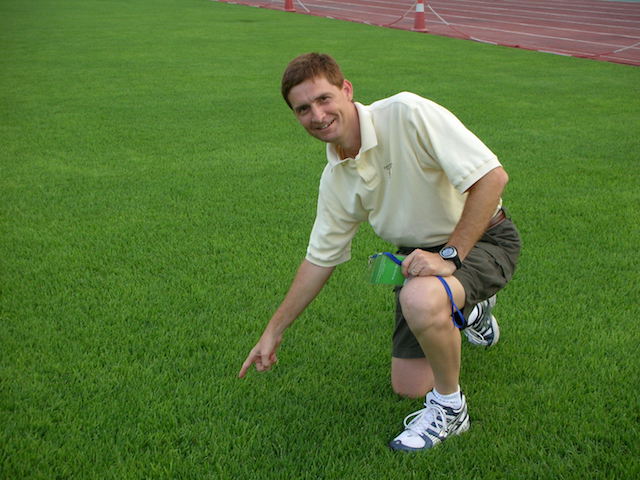Q: With the move of high school fall sports to winter/spring, I’m concerned about the amount of play on our bermudagrass fields during dormancy. We have a lot of football and soccer games scheduled in January and February? I am not as concerned with the look of the field, just if it will be detrimental to the turfgrass or the field. We usually do not overseed, but would you recommend us doing so this year?
A: This has been a common talking point across the southeastern United States, and probably most other bermudagrass growing areas. There is little doubt that the increased winter and early spring play is likely to lead to worn areas. These areas can quickly deteriorate and result in field damage.
The first approach is to do everything possible to have dense healthy bermudagrass before it enters dormancy. This will be helpful, but it will probably not be enough to sustain turfgrass cover until summer 2021. In past seasons, most of the fall sports were played on actively growing turfgrass in the early season, and it was not until near the season’s end that games and practices were held on fully dormant bermudagrass. This allowed some field recovery during the early to mid season. The delayed season this year will result in most, if not all, of the games being played on dormant turfgrass <dash> so there may be no recovery between uses.
I believe the best insurance against field damage during a winter/spring season will be overseeding. Research suggests that overseeding can help prolong turfgrass cover and protect the surface. University of Tennessee research suggests that overseeded bermudagrass may allow 50 percent more games before showing signs of severe wear. I have also measured turfgrass surface for shear strength, and often the overseed will increase surface shear strength by100 percent. That increase will provide a much more stable surface that will handle much greater traffic levels.
Of course, overseeding has its own set of challenges and added expenses, so that step may be a big one for some. But I do believe it is a good practice given the probable outcome following all the winter and spring play. It is no guarantee, but overseeding could keep the school from having to fully renovate a field next summer.
A few comments for those interested in overseeding for the first time in a while. First, you cannot seed if you have recently applied a traditional fall pre-emergence herbicide. If you have not applied a pre-emergence and but want to control annual bluegrass, the easiest thing to do would be to use foramsulfuron or rimsulfuron as a post-emergence control a week before overseeding, as per label directions.
A second suggestion would be to use perennial ryegrass. There are also newer turf-type intermediate and annual ryegrasses, but make sure you are getting a turf-type. Using an old annual ryegrass like ‘Gulf’ is not recommended. Perennial ryegrass typically gives you the greatest density, best growth habit, greater wear tolerance, and even fewer grass stains on uniforms. It is worth spending a little extra for the best seed you can afford.
A third suggestion is related to seeding rates. I generally recommend a base rate of 10 pounds of seed per 1,000 square feet (about 430 pounds per acre) for North Carolina. Even better performance can be achieved with a higher rate, but I suggest not going above 20 pounds of seed. I also do not recommend people overseed in N.C. with less than 6 pounds of seed. The lower rates can be used further to the south, where bermudagrass does not go 100-percent dormant, but it normally takes about 8 pounds of seed to get total coverage of fully dormant bermudagrass.
Lastly, do not forget that overseed grass will benefit from supplemental water and fertility to keep it healthy and growing. It will also require regular mowing. STMA has some additional resources available for maintaining high-use fields, so please be sure to check out those publications for more information.
Grady Miller, Ph.D.
Professor and Extension Turf Specialist
North Carolina State University
Questions?
Send them to Grady Miller at North Carolina State University, Box 7620, Raleigh, NC 27695-7620, or e-mail grady_miller@ncsu.edu
Or, send your question to Pamela Sherratt at 202 Kottman Hall, 2001 Coffey Road, Columbus, OH 43210 or sherratt.1@osu.edu


